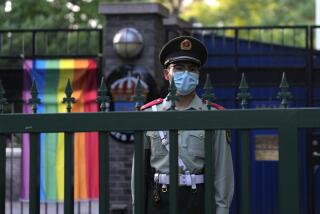Panel Is Told of Crackdown on Believers by Chinese Officials
- Share via
Amid a resurgence of religious fervor in China, the Communist government is heightening its repression of believers with mass arrests, torture and “re-education” of Christians, Tibetan Buddhists, followers of the outlawed Falun Gong sect and others, witnesses told the U.S. Commission on International Religious Freedom on Thursday.
At a daylong hearing in Los Angeles, witnesses ranging from human rights activist Wei Jingsheng to the Agya Rinpoche, a high-ranking Tibetan lama, said repression was reaching proportions not seen since the 1989 crackdown on human rights activists in Tiananmen Square.
They urged Americans to balance their trade with China with equal regard for religious freedom.
“Please remember thousands of innocent people are suffering in China’s prisons, labor camps and detention centers just because they share the same values your forefathers did,” said Xiqiu “Bob” Fu, a leader of China’s house-church movement who fled in 1997. “Don’t sell your conscience with your contracts!”
China’s treatment of religious believers is coming under fire as Congress prepares to decide this spring whether to grant the nation “normal trade status” on a permanent basis. Last year, President Clinton recommended that the status--which is reviewed annually--be rendered permanent for America’s fourth-largest trading partner. In 1999, U.S.-China trade swelled to $95 billion.
Last September, however, a newly created State Department office of religious freedom designated China as a “country of particular concern”--along with Sudan, Myanmar, Iran, Iraq, the government of Serbia and the Taliban regime of Afghanistan.
In its first full year of business, the U.S. international religious freedom commission has also chosen to focus on China, along with Sudan and Russia, and is expected to issue its first report and recommendations for action in May.
The Chinese Embassy in Washington did not respond to an invitation to participate in the hearing, a commission member said.
An officially atheist state, China guarantees religious freedom in its constitution but requires that believers refrain from “disrupting public order,” giving control to foreign powers or other activities deemed potentially subversive by authorities.
The government recognizes only five religions--Catholicism, Protestantism, Islam, Buddhism and Daoism--and heavily controls believers through registration systems, selection of clergy and other means. A new law to control organizations considered “cults” has added to the repression, witnesses testified.
Such regulations make the promise of religious liberty “almost meaningless,” according to Mickey Spiegel of Human Rights Watch-Asia.
Lu “Frank” Siqing, director of a Hong Kong-based human rights organization, said the heightened repression was linked to growing government fears of social unrest stemming from mounting unemployment and other economic woes.
In particular, the Chinese government fears the 70-million Falun Gong movement--which seeks spiritual and physical improvement through exercise and meditation--and the burgeoning underground house churches because of their large numbers, strong leaders and ties to overseas communities, he said.
More than 45,000 Falun Gong members have been arrested, sent to labor camps without trial and fired from jobs, according to spokesman Erping Zhang. The group alleges mass cases of deaths, beatings, confinement in mental institutions, forced sedation and other abuses.
In Tibet, witnesses said, repression has also been stepped up in the past three years--leading the Agya Rinpoche to abandon his high positions with the Chinese government and flee the country in 1998.
In his first public comments about his flight, the robed lama--regarded as the reincarnation of a highly revered abbot of the Kumbum Monastery--detailed how Chinese authorities began exerting increasing pressure on him: demanding that he denounce the Dalai Lama, for instance, and accept their choice of Tibet’s second highest-ranking religious leader.
“Until now, I was hoping that the Chinese leadership would rethink its policies and provide religious freedom in Tibet,” he said. “Unfortunately, that didn’t happen and the situation has continued to deteriorate.”
Boston University professor Merle Goldman said China should be “shamed” into improving its record through multinational resolutions criticizing its behavior.
Commission member Elliott Abrams said China posed the toughest test yet in trying to balance U.S. ideals of religious freedom with multibillion-dollar interests--far larger than those in South Africa, for instance. “China is different and harder, and that means we have to be smarter in trying to have an impact,” he said.
More to Read
Sign up for Essential California
The most important California stories and recommendations in your inbox every morning.
You may occasionally receive promotional content from the Los Angeles Times.














